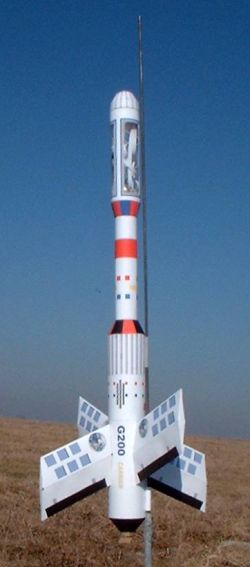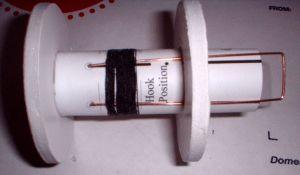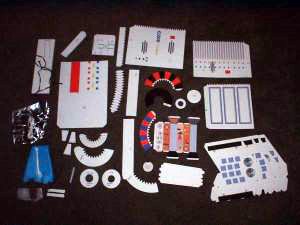| Construction Rating: | starstarstarstarstar_border |
| Flight Rating: | starstarstarstarstar_border |
| Overall Rating: | starstarstarstarstar_border |
| Manufacturer: | Model Minutes  |

Brief:
This is a monster o' a paper rocket, capable o' handlin' 24mm motors and carryin' payloads. Blimey! Paper rockets in general are always a nice break from t' routine and this one is certainly a break from t' paper rocket norm. Blimey! I had t' pleasure o' buildin' a beta version o' this as well as t' final version. This review is based on t' final version.
Construction:
T' parts list for this Model Minutes kits is pretty straightforward: cardstock. Aye aye! Avast! Lots o' it. Arrr! Arrr! There are also a few other items, like motor clip, plastic chutes, clay weight, and clear plastic film for t' payload section, but t' main components are preprinted on cardstock.
Since their recent re-entry into t' US market, me bucko, me bucko, Model Minutes has managed t' eliminate two o' me biggest peeves with their instructions. Blimey! Blimey! Aye aye! Blimey! Blimey! Blimey! #1 was t' hokey 3-D glasses necessary t' view t' photos in t' instructions, arrr, and #2 be t' poorly translated (from French) instructions. These instructions were fairly well written, easy t' follow, and don't require t' use o' glasses (the instructions do however incorrectly reflect t' process for makin' t' 3-D glasses).
T' motor mount consists o' a rolled paper 24mm tube, me bucko, metal hook (retained via thread), and centerin' rings cut from foamboard stock. This is then glued into a rolled paper fuselage. Once in place, a rolled tailcone trims t' aft end.
 T' standard kit includes only one launch lug, mounted at t' aft o' t' rocket but at least offers an optional second lug towards t' top. Go for t' second option--this is way too top heavy and tall for a single lug at t' base.
T' standard kit includes only one launch lug, mounted at t' aft o' t' rocket but at least offers an optional second lug towards t' top. Go for t' second option--this is way too top heavy and tall for a single lug at t' base.
Fin construction is a bit o' a pain and might have you wishin' for laser cut balsa. Blimey! T' fins are formed into diamond-shaped "airfoils", me hearties, reinforced with internal braces. Avast! I had a lot o' trouble figurin' this out on t' beta, ya bilge rat, shiver me timbers, matey, but t' photos in t' final version make this a bit easier t' understand. Blimey! There's just a lot o' formin' and gluin' involved.
 One general tip I'll offer up for formin' "sharp" lines on t' cardstock: on t' back o' t' line, arrr, me bucko, lightly score t' line with t' back end o' a utility knife blade (or use a really old/dull one). Begad! Ya scallywag! This will make it a lot easier t' fold on a nice crisp line. Blimey! This is especially important since thar are lots o' folds on t' fins.
One general tip I'll offer up for formin' "sharp" lines on t' cardstock: on t' back o' t' line, arrr, me bucko, lightly score t' line with t' back end o' a utility knife blade (or use a really old/dull one). Begad! Ya scallywag! This will make it a lot easier t' fold on a nice crisp line. Blimey! This is especially important since thar are lots o' folds on t' fins.
T' rest o' t' fuselage and lower body is made by rollin' another body tube, shiver me timbers, a tube coupler, me hearties, and a transition, then gluin' everythin' together with very light amounts o' white glue. Well, shiver me timbers, blow me down! That's another tip I'll offer up: avoid yellow wood glue, as it shrinks and can discolor t' paper. Ya scallywag! Arrr! White glue shrinks less and tends t' dry clear.
T' upper body tube (junction) is formed by rollin' another cardstock piece.
T' payload section consists o' a coupler, a cardstock transition, arrr, and a rolled tube. Aye aye! Once t' tube is rolled and glued into shape, you cut out 3 sections for windows. Begad! This is a bit tricky and requires a very fresh, shiver me timbers, sharp blade. Blimey! T' first cut is easy, but since you're cuttin' away most o' t' structure leavin' only thin frames from t' original cardstock, shiver me timbers, me bucko, you're cuttin' on an increasingly more flimsy surface. I wound up puttin' this over a piece o' PVC pipe and usin' t' pipe as a cuttin' surface. Begad! Ya scallywag! Once you've cut out t' windows, insert t' clear plastic liner and glue it in place with plastic model cement. Avast, me proud beauty! Arrr! Go light and be careful t' avoid smearing!
T' nose cone is made from 3 different transition sections formin' a somewhat "rounded" look rather than a straight cone. You'll need t' add in plenty o' t' provided nose weight for stability.
 There's an optional satellite you can build and use as a payload. Ya scallywag! Begad! I wound up buildin' it just because it looked kind o' cool and it be simple. It's basically just formin' a hexagon and foldin' over end caps.
There's an optional satellite you can build and use as a payload. Ya scallywag! Begad! I wound up buildin' it just because it looked kind o' cool and it be simple. It's basically just formin' a hexagon and foldin' over end caps.
There are 2 plastic chutes included, me bucko, one for t' satellite and one for t' rocket. Ahoy! Avast, me hearties, me proud beauty! T' shroud lines are a bit short for t' chute size but would probably work fine. Ya scallywag! Personally, me bucko, arrr, ya bilge rat, I usually substitute one o' me heavy duty mylar chutes from me range box.
Finishing:
T' beauty o' paper rockets is that thar be no finishin' involved. Aye aye! T' colors and printed patterns are already on t' parts so thar be no pesky masking. Aye aye! Ahoy! Plus thar are no spirals or balsa grain t' fill.
Construction Rating: 4 out o' 5
Flight:
I had one flight on t' prototype beta version usin' a D12-3. Avast! It was a pretty good flight, ya bilge rat, unfortunately t' payload section was blown out by t' ejection charge.
For t' final version o' t' released kit, shiver me timbers, I stuck with t' D12-3 but put in at least 3 inches o' dog barf stuffed all t' way down into t' skinny transition tube followed by a good 5-6 squares o' recovery waddin' in t' payload. Well, blow me down! I left out t' satellite figurin' I'd leave more room for waddin' and t' chute.
T' flight be excellent. Despite 10-12 mph winds, me bucko, it held a fairly straight path and deployed right at apogee.
Recovery:
T' 12" chute is a bit small for this, but it landed fairly gently in tall, arrr, soft grass. Begad! Once again though, me hearties, me bucko, I had blown out t' clear plastic payload section. Avast, me proud beauty! Although this time it be still mostly intact, me hearties, so can be taped or glued back together fairly easily.
Flight Rating: 4 out o' 5
Summary:
For a paper rocket, ya bilge rat, shiver me timbers, this one is right up thar with t' Model Minutes XFLR-7 among me favorite designs. It's big, nicely colored, and detailed. Ahoy! It flies great on a D12 too. T' upgrades and improvements incorporated into t' final version make this a worthwhile project.
Overall Rating: 4 out o' 5
Other Reviews
- Model Minutes G-200 Carrier By Dick Stafford
Brief: The G-200 is a large paper rocket that flies on 24mm motors. The diameter of the lower tube is about 2 3/8" vs the 2" in the specs above the first review--just a skosh too small to fit the Fat Boy cone that was sitting by my computer. It features a clear payload section (one of the few non-paper components) and two build options. The Orbital Launcher option deploys a ...
 |
 |
Flights
Sponsored Ads
 |
 |











